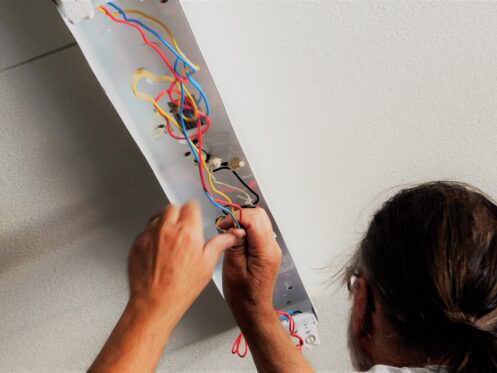Whether you’re adding an entire room to your home or remodeling a kitchen, larger renovation projects often impact the electrical system. If you intend to upgrade at least one major home appliance, your electrical system may also need to be improved. Working with wiring requires ample knowledge of electrical systems and how they work. Understanding the basics of electrical wiring can help you avoid hazards during a home renovation.
Wires Used in Residential Homes
Most residential homes use nonmetallic cables that are comprised of multiple wires that have been wrapped in sheathing. It’s possible to splice older wires with newer nonmetallic cables via a junction box. A professional electrician will know how to differentiate between the various types of wiring.
Primary Electrical Components
There are numerous electrical components that you might encounter during a home renovation project. For example, the service entrance is the area where electricity enters your home.
This system usually comes with a meter base, electrical panel, and weather head. The head is where your home connects to the power lines. As for the meter base, it contains the meter that keeps track of how much electricity your home consumes. The electrical panel consists of fuses or circuit breakers that allow you to control where electricity is sent throughout your home.
Outlets and Switches
These components are the areas where you connect electrical systems to the wiring around your home. Outlets support plug-in devices. Switches are designed to turn your fans or lights off and on.
During a home renovation, you may deal with many different types of switches and outlets, which include everything from three-way switches to GFCI outlets. Understanding how these devices work is necessary when making electrical upgrades as part of your renovation project.
Fuses and Circuit Breakers
Fuses and circuit breakers are the devices that protect your electrical system from short-circuiting or overloading. You can find these devices in your electrical panel. If you need to shut off power to a room or appliance, you can do so by switching off a breaker or fuse. While you can reset circuit breakers after tripping them, fuses must be replaced entirely if they blow.
Electrical Wiring
The electrical wiring in your house carries current to your appliances, outlets, and switches. While the most common type of wiring is nonmetallic cable, your home may consist of armored cable as well. You may need to use multiple types of electrical wiring during your renovation project.
Common Electrical Problems
If your home consists of older wiring, you’re more likely to experience electrical problems when performing a renovation. For example, the insulation around your wiring may become frayed. Keep in mind that older wiring may not be able to accommodate modern appliances. Some of the other electrical problems you might face include the following:
- Inconsistent power supply
- Frequent electrical surges
- Overloaded circuit breakers
- Light switches don’t work
- Electrical bills are high
- Dim or bright lights
Make sure you tend to these issues before starting a renovation project.
Wiring Mistakes to Avoid
There are many wiring mistakes that you need to avoid during a renovation to ensure you don’t experience an electrical fire or short circuit. For example, the minimum length for wires is 3 inches. Wires should also never be connected outside of a junction box.
If necessary, your electrical box should be installed with a wall extension. Avoid recessing the box behind a wall. It’s highly recommended that you only install a three-slot receptacle if you have a ground wire. All outlets and switches must be securely fastened to the wall. Loose switches or outlets increase the chances of a fire.
DIY or Professional for Home Renovations
Home renovation projects often require a high budget. While the idea of doing the work yourself and saving money might sound appealing, you must hire a professional electrician. Don’t work directly with electricity unless you have special industry skills and knowledge. Along with electrical fires, shocks are common. Electricians know how to install, repair, and maneuver wiring without making mistakes.
If you’re getting ready to complete a major renovation in your home, it’s best to have an experienced electrician on hand who can manage the wiring in your home and maintain the entire system. Our team at Plugz Electric offers comprehensive electrical services that include whole-home rewiring.
Before working on your home, we’ll inspect your electrical system to determine if more capacity is needed for your renovation. Residents in Forest Lake, MN can also request electrical repair, ceiling fan installation, and surge protection services. Call Plugz Electric if you have any questions about our electrical services or would like to schedule one.



